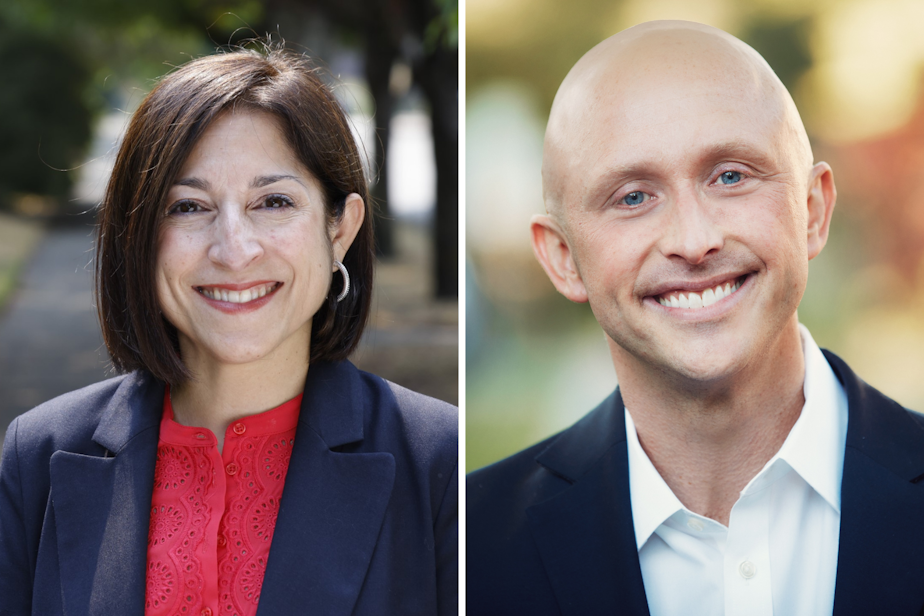A deleted tweet, a mystery MAGA supporter. What’s true and what’s not in the race for Seattle’s District 4?

Things got zesty from the get-go between tech entrepreneur Ron Davis and former City Council staffer Maritza Rivera in a live candidate event at KUOW, as the pair clashed over issues ranging from homelessness to tree canopy.
Davis and Rivera are squaring off in the Seattle City Council race to represent District 4, which includes Wedgewood, Ravenna, the University District, and other neighborhoods. The seat is currently held by Alex Pedersen, who is not running for re-election.
Rivera is running as the more moderate of the two. Her career includes a stint as President Clinton’s Hispanic liaison, and she now works as deputy director of arts and culture in Seattle Mayor Bruce Harrell's administration.
Tech entrepreneur Ron Davis is a self-described "urbanist," who has also done volunteer work including serving on the board of Futurewise, which focuses on environmental and economic policies.
During KUOW’s candidate event for District 4, Davis' answers to a question about drug policy was one moment where things got a bit heated.
At issue is Seattle's new ordinance that makes public drug use and possession illegal under city law. The measure encourages getting people into treatment over making arrests but allocates no new money to pay for treatment.
Davis told KUOW he’s a “maybe” on whether he would have voted for the new law.
Sponsored
“Does it follow the public health approach that the mayor promises? Great, let's do it. Does it follow the ‘throw him in jail’ approach that his critics say? I wouldn't support it,” Davis said, adding that if he was currently a council member, he would have enough information to make the call about how to vote.
For her part, Rivera said she supports the ordinance, and if elected, she would work with the mayor to allocate more money for drug treatment programs.
“The mayor and the city attorney were very clear that their interest was not jailing drug users, but making sure we were not having folks doing drugs in public,” Rivera said.
In her answer about drugs, Rivera didn’t miss the chance to take the following crack at Davis.
“My opponent tweeted he was opposed to prosecuting drug dealers, and then quickly took the tweet down a few days later,” Rivera said.
Sponsored
“It's completely false,” Davis responded. “I did tweet something, which was a reference to subsistence-level dealers who are addicted. In that case, prosecution is not the answer.”

The two also clashed over campaign finance, which they’ve been bringing up in recent debates to cast aspersions on one another.
The city recently fined Davis’s campaign $1,000 for failing to disclose information about who paid for two mailers that went to voters before the August primary.
“Campaign mailers are required to say, ‘Paid for by’ X and to include the campaign’s address. These mailings failed on both counts,” Seattle Ethics and Election’s head Wayne Barnett told KUOW.
Sponsored
The Rivera campaign claims this failure to disclose says something about Davis.
At KUOW’s candidate event, Davis said his treasurer is to blame for the failure to disclose, but that he takes responsibility for not “double checking” his work.
On the other side, Rivera was asked about being backed by a wealthy Trump donor. Her critics say it’s significant that a MAGA Republican wants her to win.
Rivera said she doesn’t know the Trump donor and that, by law, her own campaign isn’t allowed to coordinate with these “outside” groups.
“I want to be very, very clear that I am a lifelong Democrat. I've worked for President Clinton. I've worked for two Democratic mayors. I worked for a Democratic council member, a Democratic executive, and county executive,” she said.
Sponsored
On the question of homelessness, the two candidates disagreed once again. Rivera said she supports Mayor Harrell’s policy of encampment removals.
“I think we do need to clear these encampments, especially the dangerous ones. I mean, there's drug activity in these encampments, sex trafficking, women and youth are particularly vulnerable,” she said.
She said she supports building more emergency shelters like tiny homes until more permanent housing is developed.
Davis said he doesn't support sweeps unless emergency housing is in place.
“We need to offer housing and not just push people from park to park because that is a very expensive way to have people stay outside and continue to be in danger and sometimes a threat to others,” he said.
Sponsored
The two also sounded off about Seattle's new rules that let builders pay a fee to cut down large trees. Rivera said that's not good enough.
“We should be working with developers to make sure that as development is going up, we preserve the trees," she said. "It is a false dichotomy that it is development vs. trees. We should accomplish both, and we can accomplish both.”
Davis said the city should focus on other cost-cutting measures before it lets developers cut trees.
“There is a ton of reform we could do to make it way easier to develop. I am an urbanist. But trees are not the first thing we should cut down,” he said.






